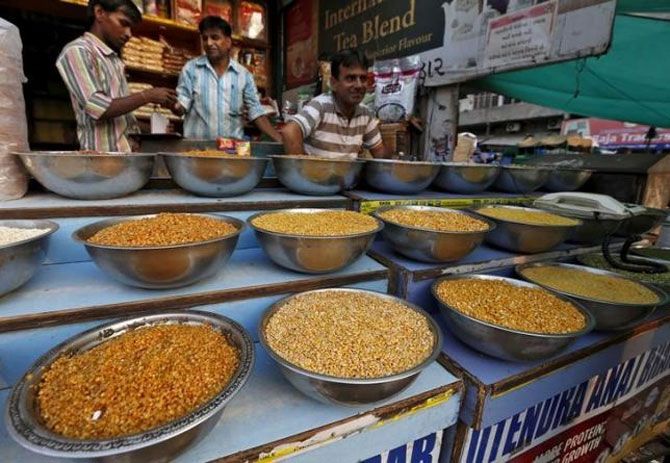Plans to enhance buffer stock to 500,000 tonnes; Gujarat exempts importers from stock limit

Even as retail prices of pulses continued to exceed Rs 200 a kg in some cities, the Centre stepped up its countrywide crackdown on hoarders and black marketers. The central government claims to have seized around 50,000 tonnes of pulses so far from 10 states, about 15,000 tonnes in the last few days alone.
Officials say the government is planning to create a buffer stock of about 500,000 tonnes, purchasing it directly from growers. From November, it is expected to start purchasing 40,000 tonnes of pulses through the National Agricultural Cooperative Marketing Federation of India and scale this up gradually. Some officials say a Cabinet note on this is being considered.
Earlier this month, minister of state for agriculture Sanjeev Balyan had announced a plan to purchase about 40,000 tonnes of pulses directly from farmers, for sale at a later date. “We would not like to stop at 40,000 tonnes and would like to be a more regular buyer in the domestic pulses market,” said a senior government official.
Meanwhile, preliminary rabi sowing data showed the area under pulses doubled to 0.98 million hectares as of Friday from 0.47 million hectares during the corresponding period last year, as farmers seem to have reacted to the price signals. Rabi sowing starts in October, while harvesting begins in March.
On Friday morning, exporters of pulses held a meeting with Finance Minister Arun Jaitley, seeking an exemption on stockholding limits. They also offered to supply around 100 tonnes of tur dal a day to the government at Rs 135 a kg, for sale through its retail outlets.
Jaitley held two rounds of meetings on the pulses crisis, first with importers and, subsequently, with senior officials from the ministries concerned. Later in the day, the Union Cabinet secretary reviewed the price situation and de-hoarding measures.
Recently, the Centre had extended the stockholding limit on pulses to include importers, exporters, departmental stores and licensed food processors.
Late on Friday, Gujarat exempted importers from a stock limit. The move is significant because unless other states follow, importers could route pulses consignments through ports in Gujarat. Earlier, the state had imposed a limit of 100 tonnes on stockists, processors and wholesalers, and five tonnes on retailers.
“Prices will come down only if there is smooth availability of imported pulses. Therefore, importers should be exempted from the stockholding limit,” Praveen Dongre, chairman of the Mumbai-based Indian Pulses and Grains Association, told reporters after the meeting.
Consignments of imported pulses, totalling about 250,000 tonnes, are lying at the port in Mumbai; the amount couldn’t be cleared due to the stock limit in Maharashtra. Traders say if Maharashtra relaxes the limit for importers, the amount lying at the port could immediately enter the market and bring down prices.
Dongre said any restriction would further dry the pipeline and ensure prices remained high.
India imports three-five million tonnes (mt) of pulses annually. In the 2014-15 crop year (July-June), consumption of pulses in the country was estimated at 23 mt, against an estimated production of 17 mt.
With an estimated 1.82 mt drop in pulses production in 2014-15, owing to drought in the primary growing regions of Maharashtra and Karnataka, the prices of pulses, led by tur, jumped sharply. In the past three months, tur prices have doubled to Rs 180-220 a kg across the country.
The rising prices led to various moves by the government, with states imposing stock limits on pulses traders, processors and importers. Odisha joined the list of states that have intensified a crackdown on hoarders. The state food and civil supplies department on Friday raided a godown storing pulses beyond permissible limits.
Since October 18, a day the Centre announced stock limits, the prices of pulses have moderated 10-15 per cent in both the spot and futures markets. Chana prices for delivery in November, for instance, fell 8.5 per cent to Rs 4,874 a quintal as of Friday, compared to its recent peak of Rs 5,329 a quintal.
In wholesale markets in the national capital, urad prices fell about Rs 200 a quintal.








 © 2025
© 2025